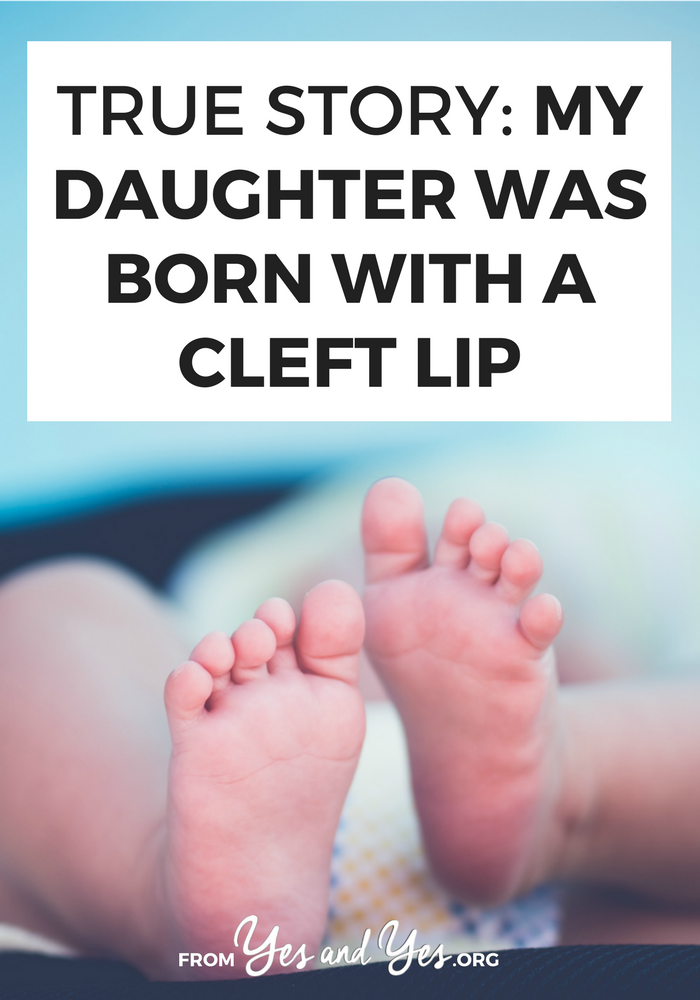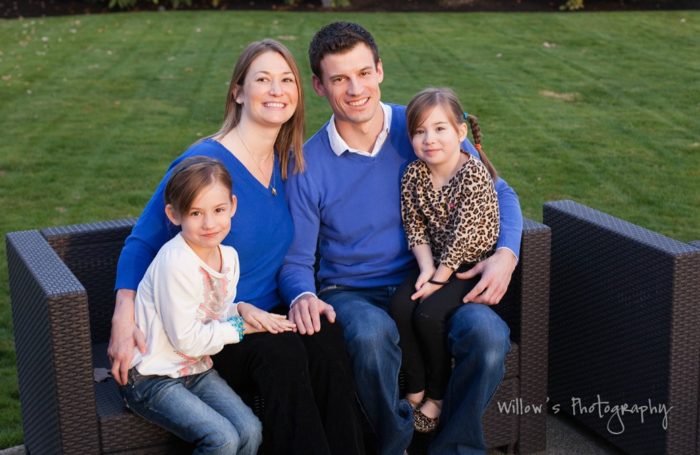
How would you feel if – minutes after giving birth – you were told your daughter had a cleft lip and would need surgery within the next year? That’s what happened to Sarah. This is her story.
Tell us a bit about yourself.
My name is Sarah, and I have lived in the New Orleans area most of my life. I’m 39 years old and spend most of my time chasing a toddler, working on home improvement projects, and visiting with family and friends, preferably while eating.
Tell us a bit about your daughter!
A lateral cleft lip is a gap on the side of the mouth where the lips would normally meet the cheek, like a really big and wide mouth. It forms in the womb as the sides of a baby’s face between their ears and their mouth spread out, but don’t completely grow together.
You can have it on one or both sides, and whichever side has the cleft is often smaller and may have skin tags. It’s rarer than a traditional cleft lip on the top of the mouth near the nose and is associated with other issues like heart problems or hearing or vision issues.
When did you discover your daughter had a cleft lip?
We found out about our daughter’s cleft a few minutes after she was born. A pediatric nurse in the room where I delivered said she had a cleft lip. It’s very difficult to detect a lateral cleft lip with ultrasounds during pregnancy.
How did you feel when you found out?
I wasn’t actually that worried in the moment because I had heard of an organization in high school that repaired cleft lips and palates in developing countries. I knew she might have surgery, but that it wasn’t a life threatening condition.
I was most worried after leaving the hospital and googling “lateral cleft” because it can be associated with other more serious issues and some genetic syndromes. The three days between her birth and seeing her cleft team were pretty nerve racking.
Your daughter had surgery to correct her cleft lip when she was six months old. Is it ‘fixed’ now? Will she need further surgeries?
Our daughter’s cleft team recommended surgery somewhere between six months and a year to repair her mouth and remove skin tags on her cheek. It was scary, but she did great. Children bounce back from that kind of thing in no time. She gets evaluated every few years by her cleft team now to make sure the scar is healing properly.
But, there is a small possibility that her scar will stretch or be uncomfortable requiring further surgeries. It’s more likely that she will need some type of dental intervention like braces though because of the smaller side of her face affecting her jaw.
Does a cleft lip affect any other aspects of your daughter’s health or development?
Before surgery, she needed help to just suck on a bottle, but after, she is developing normally. She can eat well and her pronunciation is great. We even get compliments on her ability to speak sometimes from other parents. She had smaller issues with her liver and her heart closer to birth that her doctors monitor.
Many of the things we catch with her health are common among the population but don’t get discovered because they aren’t part of routine screening. Because of the higher incidence of issues with cleft lips, her doctors like to be very aggressive with checking things out. So far, we’ve been very lucky that she hasn’t had any other major issues.
Your daughter has scars from her surgery. Do people comment on this? Does she notice this?
I don’t really see her scars anymore, so it does take me aback when people comment. Mostly adults just ignore it or don’t see it, but kids are curious and have asked a few questions. She hasn’t noticed any difference so far, but she isn’t in school yet. I know it’s coming, so we just tell her and other people casually that she was born with a mouth that was too big and a doctor made it the perfect size.
How do you walk the line between talking to your daughter about this and making too big a deal out of it?
I worry about her so much in a world that focuses on female beauty above a lot of other things like intellect and hard work and integrity. I try to be matter of fact about it like this was a thing that happened and can’t be changed.
I try to not bring it up the first time we meet people. I don’t want her scar or her cleft lip to define who she is. And if she’s insecure about it as she gets older, I’ll do what I can to help educate people and help her gain self-confidence.
Are there any resources that have helped you navigate this?
I think the best resource we had was our local cleft team because it’s a little scary to Goggle cleft lip and palate. Local hospitals have the ability to either refer someone to a team locally or close by. These teams are very experienced and include not only a surgeon, but pediatricians, speech therapists, eye doctors, genetic counselors, and even social workers.
What have you learned from this that ANY of us could apply to our daily lives?












I am so glad that your daughter got through surgery all well! I never knew what a cleft lip is, and I love your explanation of it to other people!
Charmaine Ng | Architecture & Lifestyle Blog
http://charmainenyw.com
My daughter was born with a cleft lip also! It was such a shock, and I went through a lot of emotions and went through every questionable decision that I made during pregnancy (should I have had that second cup of coffee? Was my bath too hot? What did I do wrong??). My daughter had her surgery at 3.5 months old, and it was one of the most trying experiences I’ve ever been through. She’s now 1.5 years old, and I can barely see her scar! We go for annual evaluations with her team to make sure her speech is progressing as it should and that she doesn’t need any follow up surgeries. I’m glad your daughter’s surgery was a success! I love your takeaways from your experience!
I have a question. I’m a mom and if my kid asks me a question about another child who has a cleft lip or a scar from surgery, do I just shush them or talk to them at home, or tell them something right then and there in a way they can understand? Kids have a way of blurting things out and I just want to make sure I’m guiding them properly when they have questions.